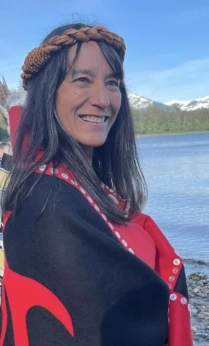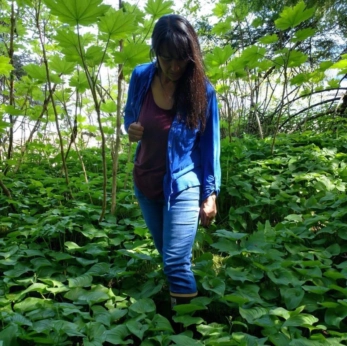A member of the Tlingit tribe, Naomi Michalsen is working to share Indigenous food systems with others to ensure those traditions don’t get lost.

Gifting your first catch, whether a moose, a deer or berries, is a Tlingit tradition.
“As a child, you learn that giving away the first catch is part of the respect for the animal, culture, and people, so I had my grandson go with me to pick berries,” says Naomi Michalsen.
“When you pick little lingonberries, it’s like picking up marbles off the ground—it’s a lot of work. He picked up the small berries, and when we were done, I told him we were going to give them away to an elder. At first, he was confused and unsure; he felt like it was so much work he should get to keep the berries. When I explained the reasoning to him, he was happy with that.
“We took them to the elder’s house and placed them on the doorknob in a bag and walked away. It was a powerful lesson for my grandson.”

Photography courtesy of Michalsen.
Michalsen, whose Tlingit name is Kaasei, lives in Ketchikan, AK, the traditional home of the Tlingit people. Food has always been an important part of Michalsen’s life, both personally and within her community. Within the Tlingit culture, the connection to food was once seen as subsistence farming and foraging. But tribe elders didn’t like the connotations of the term subsistence, feeling that it meant “less than.”
“They felt our food was so abundant, and we had so much bounty, and it was so integral to our survival, they renamed the term ‘subsistence’ to a translated version meaning ‘Tlingit food is a way of life,’” says Michalsen.
The Tlingit hunter/gatherers have inhabited the Alaska territory for thousands of years. They relied on available resources such as seafood, plants and berries for survival, nurturing and harvesting what was indigenous to the area.
Still, many Tlingit members were disconnected from the land because of physical removal from it.
“We were physically removed from the land—and because of colonization, boarding schools and separation—so much loss. The languages and our way of life were totally disrupted. As a result, many of us are trying to reconnect to that,” says Michalsen. That attempt to reconnect to a shared heritage is part of what led her to create Kaasei Training & Consulting, where she teaches about the power of Indigenous plants and foods to “honor the past, create community and change the future.”
In her educational courses, Michalsen explores the hundreds of plants that are abundant in Alaska. There’s the red and yellow cedar, used for medicinal teas as well as ceremonial fires. She looks at sustainable and respectful harvesting practices of salmon and other fish, fireweed, Labrador tea, stinging nettle, goose tongue, skunk cabbage, wild rose, numerous varieties of berries including salmon berries and red elderberry, plus hundreds of edible seaweed and kelp varieties.
“The plants are abundant,” says Michalsen. “Unfortunately, a lot of these plants are over-harvested, so it’s important to teach respectful harvesting practices. We look at these plants as sacred.”
Since the Tlingit people were separated from their culture and traditions, and their culture and history weren’t taught in schools, Michalsen says it wasn’t until she was an adult that she began to reconnect and learn the ways of her people.
Her education began with elders asking her to harvest certain plants for them. She learned each plant’s growing methods, when they were ripe and how to respectfully harvest, leaving enough for the plant to continue growth for future harvests. Then, in the early 90s, she attended a spiritual gathering of the tribes in Siberia. It was a transformational experience, says Michalsen, where she was asked by a group of women to help harvest some medicinal plants. She says the opportunity to meet others who live “close to the land and practice their ways” led to her inspiration to share this knowledge with others. She started by working for the local tribe, and also as the director at a domestic violence shelter. In traveling around the state and training others, she realized her purpose was that of prevention, intervention and healing.
“That’s what I’ll hopefully do for the rest of my life as it’s the best way I can be of service to my community.”

Photography courtesy of Michalsen.
Whether it’s getting outside on a trail or at low tide, harvesting and experiencing all the senses in the outdoors, or it’s a classroom situation where Michalsen brings the plants to people for educational purposes, she helps tribal members remember where they came from and what is available just outside their doorsteps.
In hands-on classes, she might teach methods for harvesting and making medicines, creating first aid kits with insect repellant, salves and herbal teas, or cooking something together to remember ancient practices.
Her classes run the gamut from four-day training or cultural workshops to hour-long presentations or an online plant symposium. She says there’s always more connection to the concepts of sustainable foraging and traditional meals when folks have a chance to experience the foods themselves.
”Many of us, we … didn’t grow up with these kinds of foods and tastes, and so when we try these things, and we realize how good they are for us and how delicious they taste, we’re more likely to want to protect those traditions. But, unfortunately, if we’re not connected to the land and to the foods, we’re not likely to care about these things.”
Sharing these practices is crucial, because, she says, “If we don’t share with anyone, then it’s not going to get passed down. And that’s what happened to our parents and grandparents when they were forced to relocate or forced into boarding schools. They were beaten for talking their language or eating their foods. So, in this way, by educating and sharing our culture and traditions, we’re reclaiming our history and who we are.”
It’s fascinating to meet a modern farming consultant who is dedicated to preserving and sharing ancient culture and traditions in Alaska. Her work embodies the commitment to preserving cultural heritage and sustainable practices.
I love giving away the first catch! Like tithing a rewarding habit allowing us to be aware of others and environment. Fascinating.